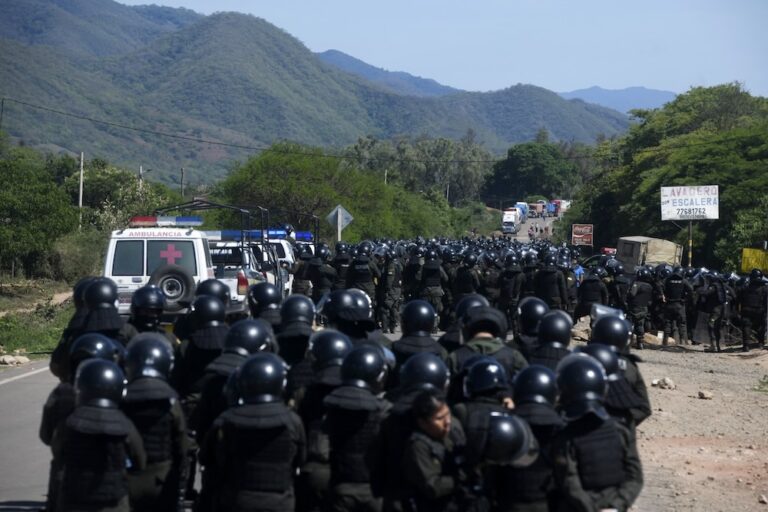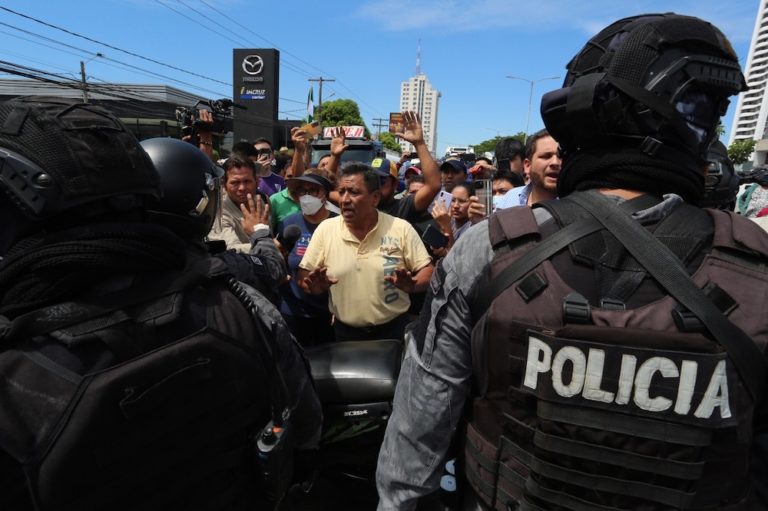(IAPA/IFEX) – The following is an 11 April 2002 IAPA press release: IAPA DEMANDS INVESTIGATION INTO MURDER OF BOLIVIAN JOURNALIST AND JOINS THE HEMISPHERE’S PRESS IN MOURNING Miami (April 11, 2002) – The Inter American Press Association (IAPA) demands that the President of Bolivia, Jorge Quiroga, take the necessary steps to ensure that a prompt […]
(IAPA/IFEX) – The following is an 11 April 2002 IAPA press release:
IAPA DEMANDS INVESTIGATION INTO MURDER OF BOLIVIAN JOURNALIST AND JOINS THE HEMISPHERE’S PRESS IN MOURNING
Miami (April 11, 2002) – The Inter American Press Association (IAPA) demands that the President of Bolivia, Jorge Quiroga, take the necessary steps to ensure that a prompt and in-depth investigation is launched to find out the motive behind last night’s attack in La Paz that claimed the life of Bolivian journalist María Teresa Guzmán de Carrasco, executive director of El Diario newspaper and wife of the newspaper’s general director, Jorge Carrasco Jahnsen.
IAPA President Robert Cox said that “this is one of the saddest days for the hemisphere’s press because we have lost a great woman and an excellent journalist. We are in pain and join with Jorge and his children, Jorge and Antonio Martín, and the entire family of journalists at El Diario, as well as all our Bolivian colleagues, in mourning this irreparable and painful loss.”
Cox, who led the IAPA mission to Bolivia last January along with officers of the organization, recalled that “we had the opportunity of working hand-in-hand with María Teresa and her husband. Her hard work and dedication to journalism were essential to the success of our visit during which President Quiroga and the highest legislative and judicial authorities promised to support press freedom.”
María Teresa Guzmán de Carrasco was killed on her way home from the newspaper at 10:15 p.m., when a bomb went off in the back of the vehicle. The family’s driver, Guillermo Zenteno, was injured. Minutes before, she had just said goodbye to her husband who stayed behind at the office to review the next day’s paper.
In his letter to the Bolivian President, Cox highlighted the importance that this act not go unpunished and noted that solving this crime is essential so that there are no more tragic acts that harm freedom of the press and the public’s right to information.
Meanwhile, the chairman of the IAPA’s Committee on Freedom of the Press and Information, Rafael Molina, indicated that the IAPA suspects that the attack could have been directed toward the victim’s husband, Jorge Carrasco, who used that vehicle, but stayed behind because he was reviewing the front page of the next day’s edition. Carrasco’s wife would have left the paper earlier, but this time she stayed later than usual because they had been preparing an editorial together.
Carrasco told the IAPA that his wife was a victim of an attack that “had my name on it”, one that he believes is in retaliation of the journalistic work of the newspaper, including some investigations that El Diario was about to publish and had leaked to the public. He also expressed that he had no doubt that this was a planned campaign against his newspaper, since in the last six months his wife was the eleventh victim of a violent attack. Carrasco added that although El Diario had not had to mourn the loss of other fatalities, “our newspaper and employees have had to suffer punches, kicks and other threats on the streets as a result of our work.”
“The status of freedom of the press in our country is very delicate,” Carrasco declared.
Cox, Molina, and Andrés García Gamboa, IAPA First Vice President, participated in the IAPA mission to Bolivia last January along with IAPA staff, and recognized the journalistic value El Diario has always had during the 98 years since its founding on April 5, 1904. The IAPA officers praised the newspaper’s continuous struggle for freedom of the press in Bolivia, always being considered the “steward” of press freedom, as well as its important support for the cause within the IAPA.
The IAPA officers added that the murder of María Teresa Guzmán de Carrasco is another “deep wound” for El Diario and they hope that the Bolivian government would keep its promise to solve this crime and prevent future acts of violence that harm freedom of the press and the public’s right to information.


